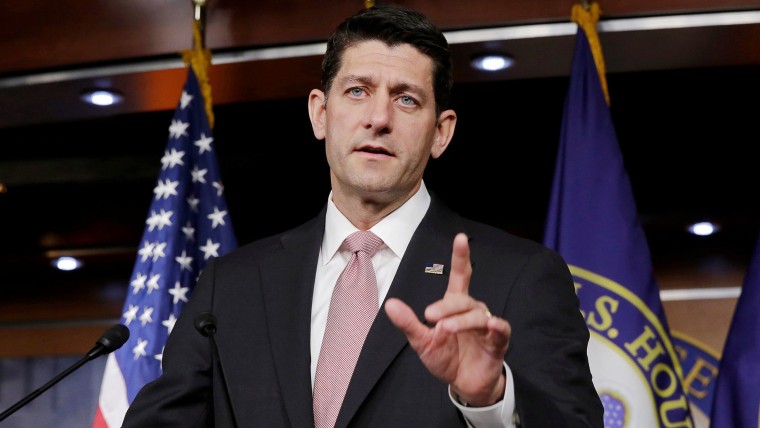To hear Donald Trump tell it, the new Republican health care plan already enjoys overwhelming public support. In brief remarks yesterday afternoon, the president said, "I'm already seeing the support... I'm seeing it from everybody. And I'm seeing it from the public."It's not clear how Trump, who's repeatedly made up evidence he wants to believe, has seen already public support for legislation that was unveiled less than a day earlier, but even putting that aside, if the president believes "everybody" backs the Republican blueprint, he's spectacularly wrong.
[M]any Republicans balked at the details of the bill when it was released late Monday. Some called the proposal "Obamcare Lite" while others questioned whether it would provide adequate coverage, demonstrating the challenges facing GOP leadership in trying to pass the legislation.Members of the House Freedom Caucus and two conservative Republican senators -- Rand Paul of Kentucky and Mike Lee of Utah -- held a press conference outside the Capitol Tuesday afternoon to press their case against the bill.
Yesterday afternoon, House Speaker Paul Ryan (R-Wis.), showing unusual bravado, told reporters, "We will have 218 votes. This is the beginning of the legislative process. We'll have 218 when this thing comes to the floor. I can guarantee you that."Soon after, members of the far-right House Freedom Caucus said the exact opposite. "Right now the Speaker of the House does not have the votes to pass this bill unless he's got substantial Democratic support," Rep. Mo Brooks (R-Ala.) said after leaving a Freedom Caucus meeting. (Ryan will likely have zero Democrats votes.)Note, there are currently five vacancies in the House, which means a bill will need 216 votes to pass. There are 237 House Republicans, which means GOP leaders can lose no more than 22 votes.The House Freedom Caucus has roughly 40 members.In the Senate, Republicans have an even smaller margin of error. In a 52-48 chamber, if three GOP senators balk, Republicans will either need Democratic votes or a bill dies.As of yesterday, Rand Paul and Mike Lee said they hate the House bill. A day earlier, four different GOP senators — West Virginia's Shelley Moore Capito, Colorado's Cory Gardner, Alaska's Lisa Murkowski, and Ohio's Rob Portman -- said they're not comfortable with the House plan's approach to Medicaid expansion. Yesterday, Maine's Susan Collins said she agrees with them.Collins and Murkowski, meanwhile, have also balked at the House bill gutting funding for Planned Parenthood (which, full disclosure, my wife works for).Counting heads, that's seven Republicans who've publicly raised concerns about the bill in a chamber in which only three Republicans are needed to kill legislation. Sen. Roy Blunt (R-Mo.), a member of the GOP's leadership team, grudgingly acknowledged yesterday that the House bill "may not be a plan which can get a majority" in the upper chamber.And that's just a review of where things stand among members. We also learned yesterday that most of the major conservative organizations -- Heritage Action, Club for Growth, Americans for Prosperity, and FreedomWorks, among others -- have already announced their opposition to the House bill. And whether Paul Ryan likes it or not, some of his members actually care what these groups have to say about major legislation.If Donald Trump genuinely believes the American Health Care act is supported by "everybody," he's going to be deeply disappointed.
